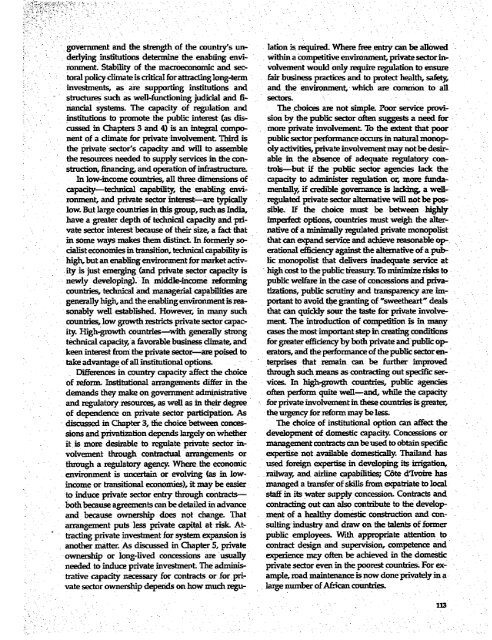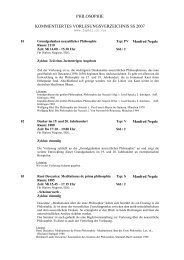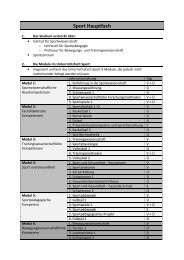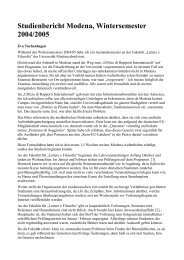ASi" kUCTURE FlOR DEVELOPMENT
ASi" kUCTURE FlOR DEVELOPMENT
ASi" kUCTURE FlOR DEVELOPMENT
Create successful ePaper yourself
Turn your PDF publications into a flip-book with our unique Google optimized e-Paper software.
government and e strength of the country's un- lation is required. Where free ertry can be allowed<br />
derlying institutions determine the enabting envi- witbin a competitive enviromment, private sector inronment.<br />
Stability of the macroeconomic and sec- volvement would only require regulation to ensure<br />
toral policy limate is critical for attracting long-term. fair business practices and to protect health, &aft<br />
investments, as are supporting institutions and and the environment, which are common to all<br />
structures such as well-functioning judicial and fi- sectors.<br />
nancial systems. The capacity of regulation and The choices are not simple. Poor service proviinstitutions<br />
to promote the public interest (as dis- sion by the public sector often suggests a need for<br />
cussed in Chapters 3 and 4) is an integral compo- more private involvement To the extent that poor<br />
nent of a climate for private involvement Third is public sector performance occurs in natuxal monopthe<br />
private sector's capacty and will to assemble oly activities, private involvement may not be desirthe<br />
resources needed to supply services in the con- able in the absence of adequate reglatory construction,<br />
financng, and operation of infrastructure. trols-but if the public sector agencies lack the<br />
In low-hicome countries, all three dimensions of capacty to administer regulation or, more fondacapacity-technical<br />
capability, the enabling envi- mentally, if credible govemance is lading, a wellronment,<br />
and private sector interest-are typically regulated private sector altemative will not be poslow.<br />
But large countries in this group, such as India, sible If the choice must be between highly<br />
have a greater depth of technical capacity and pri- imperfect options, cotutries must weigh the altervate<br />
sector interest because of their size, a fact that native of a minimally regulated private monopolist<br />
in some ways makes them distinct In formerly so- that can expand service and achieve reasonable op.<br />
cialist economies in transition, technical capability is erational efficienqc against the alternative of a pubhigh,<br />
but an enabling environument for market activ- lic monopolist that delivers inadequate service at<br />
ity is just emerging (and private sector capacity is bhigh cost to the public teasury To minmize risks to<br />
newly developing). In middle-income reforming public welfare in the case of concessions and privacountries,<br />
technical and managerial capabilities are tizations, public sautiny and tran cy are imgenerally<br />
high, and the enabling environment is rea- portant to avoid the granting of "sweetheart" deals<br />
sonably well established. However, in many such that can quicldy sour the taste for private involvecounties,<br />
low growth restricts private sector capac- ment The introduction of competition is in many<br />
ity. High-growth countries-with generally strong ases the mostimportant step in creating conditions<br />
technical capacity, a favorable business climate, and for greater efficiency by both private and public oPkeen<br />
interest from the private sector-are poised to erators, and the performance of the public sector entake<br />
advantage of all institutional options. terpnises that remai an be furither improved<br />
Differences in country capacity affect the choice through such means as contracting out specific serof<br />
reform. Instituttional arrangements differ in the vices. In high-growth countries, public agences<br />
demands they make on government administrative often perform quite well-and, while the capacity<br />
and regulatory resources, as well as in their degree for private involvement in these countries is greater,<br />
of dependence on private sector participation. As the urgency for reform may be less.<br />
discussed in Chapter 3, the choice between conces- The choice of institutional option can affect the<br />
sions and prnvatization depends largely on whether development of domestic capacity. Concessions or<br />
it is more desirable to regulate private sector in- management contracts can be used to obtain specific<br />
volvement through contractual arrangements or expertise not available domesticaly. Thailand has<br />
through a regulatory agency. Where the economic used foreign exetse in developing its irrigation,<br />
environment is uncertain or evolving (as in low- railway, and airline capabilities; C6te d'Ivoire has<br />
income or tmnsitional economies), it may be easier managed a transfer of skills from expatriate to local<br />
to induce private sector entry through contracts- staff in its water supply concession. Contracts and<br />
both because agreements can be detailed in advance contracting out can also contribute to the developand<br />
because ownership does not change. That ment of a healthy domestic construction and con-<br />
* arrangement puts less private capital at risk At- sulting industry and draw on the talents of former<br />
tracting private investment for system expansion is public employees. With appropriate attention to<br />
another matter. As discussed in Chapter 5, private contract design and supevision, competence and<br />
ownership or Iong-lived concessions are usually expence may often be achieved in the domestic<br />
needed to induce private investmernt The adminis- private sector even in the poorest countries. For extrative<br />
capacity necessary for contracts or for pri- ample, road maintenance is now done privately in a<br />
vate sector ownership depends on how much regu- large number of African countries.<br />
-- ' - .-<br />
., . - '-' .' ~~~~~~~~~~~~
















